FDP threaten coalition (again) with opposition to pension reform ++ Pistorius speculation grows: Defence Minister will stand for Bundestag
Tuesday 1st October
Good morning. Plenty to update you on today, including the FDP’s latest threats to the ‘traffic light’ coalition, growing speculation about a palace coup in the SPD, personnel changes at Nato, and a deep-dive into the nasty impact conflict in the Middle East is having on Berlin’s club scene.
Tagesspiegel: ‘Dispute over new pension package: Resistance is growing in the FDP’
Tagesspiegel reports that the FDP may oppose one of Chancellor Scholz’s prize policies (and an explicit part of the coalition agreement), Rentenpaket II (Pension Package II), which aims at increasing the state pension partly through increased employee and employer contributions.
The emphasis here appears to be on opposition within the FDP coming from below the federal leadership. Tagesspiegel quotes several of the party’s state leaders, including Bavaria, Baden-Württemberg, Thuringia and Saxony, all speaking out against the reforms. Federal leader Christian Lindner’s position remains unclear.
There is suggestion here that some in the FDP are trying to use the issue as an ‘exit strategy’ to trigger a collapse of the coalition. SPD Chair Lars Klingbeil, speaking to Politico yesterday, hinted at the consequences of failing to deliver this reform.
“"This was also a condition for the SPD's entry into the coalition," This is "not an SPD point, this is a point of the coalition agreement". He firmly assumes that the FDP will honour them.”
Tagesspiegel’s reporter adds that “Some Social Democrats would like to see Chancellor Scholz provide strong leadership in the event of FDP opposition to the second pension package or possible aid for German industry, to the point of wanting to sack the FDP ministers.”
SPD speculation intensifies: Pistorius will run for Bundestag
The SZ reports that, in a “somewhat explosive” move, Boris Pistorius will stand in his home town of Hannover at the next federal election, fuelling the already wild speculation that he might be coming for Olaf Scholz’s job.
Pistorius is far more popular than both Scholz, the presumed SPD candidate (though this won’t currently be made official until next June) and Friedrich Merz, who was recently crowned as the CDU’s candidate.
The article reports Pistorius’ comments while campaigning for Dietmar Woidke in Brandenburg last week:
“When a voter recently told him during a street election campaign in Brandenburg that he, Pistorius, had to take action, referring to the example of Joe Biden swapping candidates for Kamala Harris in the US Democratic Party, Pistorius said: "You can have lots of ideas. I don't have that idea." He could always give the answer to the ‘K question’ in new words. "But it always remains the same answer."”
According to the SZ, the SPD federal leadership and its state leaders “emphasise that they want to back Scholz, but are keeping all options open. […] If the SPD is only able to play a junior role in a oalition with the CDU/CSU after the next general election, Pistorius is also being considered as a candidate for the office of Federal Minister of the Interior due to the ongoing issue of irregular migration and the other challenges - he has gained some experience in this area during his ten years as Lower Saxony's Minister of the Interior.”
See also
FAZ: ‘He was supposed to build a bridge to Putin’: Thomas Gutschker on Jens Stoltenberg’s time at the helm of Nato
FAZ’s man in Brussels Thomas Gutschker marks the departure of Jens Stoltenberg as NATO Secretary-General after 10 years in the job with a somewhat ironic, but overall very sympathetic review of his legacy. Gutschker reminds readers that it was Angela Merkel who argued to President Obama for Stoltenberg to take the job in February 2014, in the hopes that the former Norwegian Prime Minister would lead a conciliatory approach to Moscow. After the Russian annexation of Crimea, Gutschker says,
“Stoltenberg was no longer Merkel's natural ally, who was endeavouring to strike a balance with Moscow, but a driver of change. He called on Germany and other allies to fulfil the two per cent pledge and to do more militarily to protect the alliance's territory in the east. He also succeeded in keeping Donald Trump in NATO - even though the new American president declared the alliance obsolete and even threatened to withdraw the USA in 2018.”
Stoltenberg is being replaced at Nato by former Dutch Prime Minister Mark Rutte. Gutschker says the outgoing Secretary-General is tipped to become the new Chair of the Munich Security Conference.
Tagesspiegel: ‘"Graffiti, faeces, acid": Berlin techno club About Blank defends itself against attacks from the pro-Palestine scene’
Tagesspiegel’s Madlen Haarbach delves into the bitter impact which the conflict in the Middle East is having on Berlin’s club scene, focusing especially on the Ostkreuz techno-bunker, About://Blank. The club, which according to Haarbach is run by a “leftwing collective”, has been attacked with all sorts, including human faeces and acid, apparently by pro-Palestinian activists, and subject to a boycott, over its plans to host an event in memory of the hundreds of people killed at a techno festival in the Negev Desert during Hamas’ onslaught on October 7th last year.
Handelsblatt: ‘Next rate cut will be even more crucial — especially for Germany’
Handelsblatt’s Stefan Reccius and Leonidas Exuzidis argue that it’s Germany that will be most relieved by the ECB’s next rate cut, another piece of irony surrounding the country’s relationship with the Bank together with the ongoing Commerzbank fiasco: “The fact that Germany, of all countries, is dependent on interest rate cuts by the ECB is not without irony. After all, it was German economists and bank representatives who railed fiercely against the ECB's permanently low interest rates just a few years ago. There was talk of savers being "dispossessed".”




